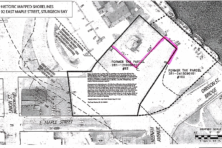Commentary: Farmers Play by the Rules, the DNR Should Too
- Share
- Tweet
- Pin
- Share
by Mike North, president of the Dairy Business Association
The Wisconsin Department of Natural Resources (DNR) articulates its vision this way:
“We excel at protecting and managing natural resources while supporting the economy and the well-being of our citizenry.”
What’s missing is “while working within the law.”
On July 31 – with frustrations, uncertainty and costs mounting among our dairy farmers around the state – the Dairy Business Association filed a suit to bring the law back to life for the DNR. After years of our farmers running into walls turn after turn with contradictory, baseless and overreaching rules, we decided enough is enough.
The last straw in this pattern of unlawful behavior was the DNR’s abrupt shift on how farmers manage rainwater that comes into contact with feed storage and calf hutch areas. In making the change in spring 2016, the agency said no – erasing an earlier yes – to the use of vegetative treatment areas, which many farmers had developed at great expense. The costs involved in things like digging test holes, hiring engineers, using excavators to slope the ground and installing flow control systems add up quickly.
Putting aside the suspect wisdom of the change itself – it creates the very real possibility of hurting, not helping, the environment – there’s a much more important consideration: This happened outside the bounds of state law.
Act 21, which took effect in 2011, requires all state agencies to follow a specific method of rulemaking based on public transparency and lawmaker oversight. The DNR circumvented this law by masking what amounts to formal rules as “guidance” directives and began enforcing them as regulations.
These are no small changes. Farmers will need to spend millions of dollars on new storage lagoons and calf hutch areas. Imagine if you had to spend $600,000 to design your yard in a way that prevented all rainwater from running into the street. Then, you were arbitrarily told you had to spend $1.5 million to tear up the yard, put in a swimming pool and install a piping system to collect the rainwater. The pocketbook impact is significant.
Not only do these new requirements harm existing users of these systems, they create uncertainty for farmers who want to grow or make other improvements to their facilities. Farmers want to do the right thing for the environment, but the constant changing of the rules of the game makes it difficult to keep our landscape green and growing.
It is this uncertainty and a generally unfriendly regulatory environment that have led many farmers to invest elsewhere. Millions of dollars in investment that should have been made in Wisconsin communities have gone to a handful of other states. As farms move, processors are beginning to follow them with new facilities as well. Our very status as America’s Dairyland could be at risk.
The lawsuit also addresses another critical area in which the DNR is exceeding its authority – permitting of large livestock farms. Federal law makes a farm apply for a special type of permit (Wisconsin Pollutant Discharge Elimination System) only if it discharges nutrients to a navigable surface water. But our state wrongly presumes that all farms of a certain size have unlawful discharges.
This means all large farms become regulated concentrated animal feeding operations even if they have done nothing wrong. This is not the federal requirement, it is unfair and it wastes department resources.
To meet the added regulations, those farmers have to hire professional engineers to design manure and wastewater management plans and facilities.
To be clear, this is not about farmers looking for a free pass on regulations. Not at all. Regulations – that should be fair, consistent and scientifically sound – are a part of doing business. What this is about is stopping the DNR from regulating outside of legal boundaries.
None of us – farmers or anyone else – is above the law. That should include the Department of Natural Resources.

